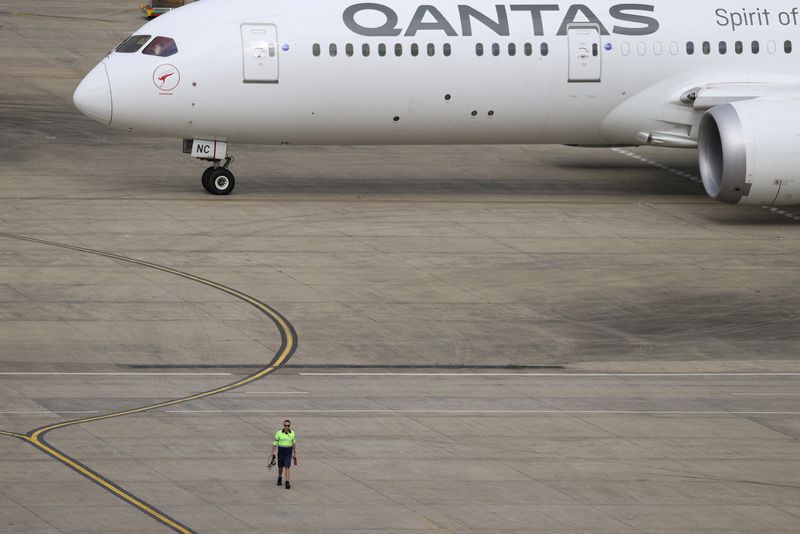By Jamie Freed
SYDNEY (Reuters) -Qantas Airways Ltd said on Thursday it would buy back up to A$400 million ($276 million) of shares after the lifting of COVID curbs spurred a strong rebound in travel demand, surprising the market and sending its shares up 6%.
The rush to travel once borders opened boosted its second-half performance and helped lower debt levels, although it has also led to a host of operational problems that have contributed to the airline winding back planned increases in domestic capacity.
"We always knew travel demand would recover strongly but the speed and scale of that recovery has been exceptional," Qantas Chief Executive Alan Joyce told reporters.
The airline posted an annual underlying loss before tax of A$1.86 billion in the 12 months ended June 30, wider than the A$1.77 billion restated figure from a year earlier and slightly more than analyst forecasts.
The bulk of the losses were reported in the first half when domestic and international borders were closed under strict measures to contain the COVID-19 pandemic.
Jefferies analyst Anthony Moulder said in a note that Qantas looked well-positioned to return to profitable growth this financial year despite higher oil prices.
Qantas Chief Financial Officer Vanessa Hudson (NYSE:HUD) said a measure combining ticket prices and the percentage of seats filled would need to rise 10% in the domestic market and 20% in the international market this year to recover the higher fuel cost.
Joyce told analysts those targets were being achieved at this point, adding that was part of the reason the airline cut its domestic capacity forecast for 2022/23 to 101% of pre-COVID levels, down from around 110% previously.
The airline reduced debt levels below its target range, putting it an a position to repay shareholders that had provided A$1.4 billion of equity to help it weather the pandemic.
It also plans to run a competition between aircraft manufacturers to replace its ageing fleet of 28 Airbus SE (OTC:EADSY) A330 planes in the next 12 to 18 months, Hudson said.
REPUTATIONAL HIT
While demand has improved, Qantas in recent months has been trimming its domestic capacity from earlier forecasts due to widespread staff shortages at airports, high rates of crew illness in winter and elevated fuel prices.
On Sunday, Qantas said it would offer A$50 flight vouchers, loyalty status extensions and lounge passes to frequent flyers, a move to apologise for a rise in delays, cancellations, lost baggage and staffing issues since travel demand rebounded.
"Our brand has taken a hit," Joyce said on Thursday. "You would expect that given the performance we have had."
However, he noted the airline's reputation had rebounded fairly quickly from prior low points such as in 2011, when management temporarily grounded the carrier amid an industrial relations dispute.
The airline now faces industrial action from engineers, beginning with one-minute work stoppages, as they push back against its standard offer to unions of a two-year wage freeze followed by 2% annual increases amid soaring inflation.

Qantas said it expected to spend A$50 million on pay increases for employees covered by union agreements this financial year and to improve staff travel benefits. It had already set aside A$200 million for a A$5,000 recovery bonus and 1,000 share rights for more than 17,000 staff.
($1 = 1.4476 Australian dollars)